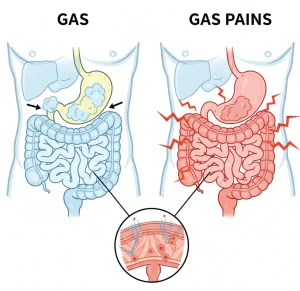Overview
Diagnosis
A healthcare professional will usually determine the cause of gas and gas pains by reviewing your medical history, dietary habits, and performing a physical examination.
During the physical exam, the healthcare provider may gently press on your abdomen to check for tenderness or unusual sensations. Listening to the sounds of your belly with a stethoscope helps assess how well the digestive tract is functioning. In some cases, a rectal examination may be done depending on symptoms and findings.
If additional symptoms are present, such as weight loss, blood in the stool, or persistent diarrhea, more tests may be recommended to identify the underlying cause.
Treatment
When gas pains are caused by another medical condition, treating the root cause can provide relief. In most cases, bothersome gas can be managed through diet changes, lifestyle adjustments, and nonprescription medications. Because each person responds differently, finding the right combination often requires some trial and error.
Diet
Making dietary changes can help reduce the amount of gas produced in the digestive system or allow it to pass more easily. Keeping a diary of foods and symptoms helps identify which foods contribute most to discomfort. You may need to eliminate or reduce certain foods and gradually reintroduce them as symptoms improve.
Reducing or avoiding the following may help improve gas symptoms:
-
High-fiber foods such as beans, onions, broccoli, Brussels sprouts, cabbage, cauliflower, artichokes, asparagus, pears, apples, peaches, prunes, whole wheat, and bran. Try removing these foods for a short period and reintroducing them slowly while monitoring symptoms.
-
Dairy products if lactose intolerance is suspected. You can try lactose-free products or milk with added lactase to aid digestion.
-
Sugar substitutes such as sorbitol or xylitol, which can increase gas.
-
Fried or fatty foods that slow digestion and delay gas clearance.
-
Carbonated beverages that introduce excess air into the digestive tract.
-
Fiber supplements, which may need adjustment based on your healthcare provider’s recommendation.
-
Inadequate water intake. Drinking water throughout the day and with meals helps digestion and prevents constipation.
Nonprescription remedies
Several over-the-counter products may help reduce gas discomfort for some people:
-
Alpha-galactosidase supplements (such as Beano or BeanAssist) help break down complex carbohydrates in beans and vegetables when taken before meals.
-
Lactase supplements (such as Lactaid or Digest Dairy Plus) assist with digesting lactose in dairy products, helping reduce gas in people who are lactose intolerant.
-
Simethicone products (such as Gas-X or Mylanta Gas Minis) may help gas move through the digestive tract more easily, though clinical evidence is limited.
-
Activated charcoal (such as Actidose-Aqua or CharcoCaps) taken before and after meals may reduce gas for some, though research results are mixed. Charcoal can interfere with medication absorption and may cause staining.
-
Peppermint oil, which has been shown in studies to calm the gastrointestinal tract and ease symptoms of irritable bowel syndrome.
Advertisement

